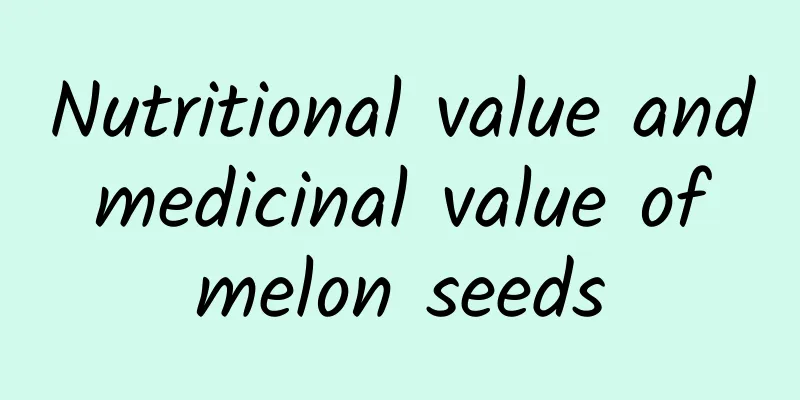Nutritional value and medicinal value of melon seeds

|
Many people are not very familiar with melon seeds. The real name of melon seeds is actually trichosanthes seeds, which are perennial herbaceous vines of the Cucurbitaceae family. The nutritional value of melon seeds is very rich, and they have very significant medicinal effects, so they have been recorded in many famous medical books. So where exactly is the medicinal value of melon seeds reflected? Let's take a look below. Nutritional value of melon seedsMelon seeds have high nutritional value. They contain 16.8% unsaturated fatty acids, 5.46% protein, 17 kinds of amino acids, trisapogenin, multiple vitamins, and 16 trace elements such as calcium, iron, zinc, and selenium. In particular, they are rich in vitamin E (100 grams of melon seeds contain 249 mg of vitamin E), which can nourish the skin, eliminate wrinkles, regulate the body, and delay aging. Eating melon seeds can also dilate the coronary arteries and increase coronary flow. Medicinal value of melon seedsMelon seeds are one of the most commonly used Chinese herbal medicines. Melon seeds are valuable all over. Both the fruit and the root of Melon seeds can be used as medicine. The fruit is called whole Melon seeds, the shell is called Melon seeds skin, the seed is called Melon seeds kernel, and the root is called Radix Trichosanthis. Melon seeds have the effects of clearing away heat and resolving phlegm, widening the chest and dispersing knots, moistening the intestines, and reducing swelling and discharging pus. The skin of the melon seeds is mainly used to treat lung heat cough, chest and flank pain, sore throat, breast abscesses and breast carbuncle; the melon seeds are mainly used to treat phlegm heat cough, lung deficiency and dry cough, intestinal dryness and constipation, carbuncle and swelling; the radix trichosanthis is mainly used to treat fever thirst, polydipsia, lung heat and dry cough, sores and swelling. With the continuous improvement of modern medicine, the application of melon seeds in medicine is no longer limited to Chinese herbal medicine. The fruit of the melon contains volatile oils such as triterpenoids, organic acids, resins, sugars, pigments, serine, saturated fatty alcohol mixtures, and saturated fatty acid mixtures. The seeds of the melon contain oils, sterols, triterpenes and their glycosides. The roots contain trichosanthin, various amino acids, peptides, and polysaccharides. The melon seeds have the effects of dilating coronary arteries, resisting myocardial ischemia, improving microcirculation, inhibiting platelet aggregation, resisting hypoxia, and resisting arrhythmia on the cardiovascular system. It has anti-ulcer and laxative effects on the digestive system. In addition, the seeds of the melon have antibacterial, anti-aging, anti-cancer, and anti-AIDS effects. The edible value of the melon seeds: The seeds of the melon seeds account for more than one-third of the net weight of the melon seeds, and one melon seed fruit contains 70 to 220 seeds. The modern development of the edible nature of the melon seeds is mainly reflected in the seeds of the melon seeds. Modern medical research has shown that the seeds of the melon seeds contain 16.8% unsaturated fatty acids, 5.46% protein, 17 kinds of amino acids, three saponins, multiple vitamins, and 16 trace elements such as calcium, iron, zinc, and selenium. Eating Trichosanthes seeds can dilate the coronary arteries and increase coronary flow; it has a significant protective effect on acute myocardial ischemia; it has a strong effect on the proliferation of choriocarcinoma cells in vitro and HIV; it has a certain therapeutic effect on diabetes; it has an auxiliary effect on hypertension, hyperlipidemia, and high blood viscosity; it can improve the body's immune function; and it has the effect of slimming and beauty. In recent years, with the increase in people's awareness of green food and the increase in the aging of the population in my country, most elderly people suffer from diseases such as "three highs" and constipation. Eating Trichosanthes seeds will surely become the first choice of leisure green health food for middle-aged and elderly people. Warm reminder: Hanging melon seeds are the best among melon seeds. Many people eat them as a nourishing food. Indeed, hanging melon seeds are very helpful to human health. It is recommended that more people take them as health food. |
<<: Nutritional value of cucumber
Recommend
How is the Teramo Conservatory of Music? Teramo Conservatory of Music reviews and website information
What is the website of Teramo Conservatory of Musi...
The efficacy and function of ripe orange seed powder
Ripe orange seed powder is a white powdery substa...
How to make delicious fish-flavored eggplant
Fish-flavored eggplant is a favorite dish of many...
How to wash mussels cleanly? How to wash dried mussels
Mussels are a kind of seafood ingredient, and man...
How is Eastman Chemical Company? Eastman Chemical Company Reviews and Website Information
What is the website of Eastman Chemical Company? E...
The efficacy, function and medicinal value of jujube
Jujube, also known as red dates, is a common food...
How to make Omelet Rice Ingredients and common methods of making Omelet Rice
Have you ever eaten Omurice? It is one of the mos...
What is the Oceania Badminton Confederation? Oceania Badminton Confederation Reviews and Website Information
What is the website of Badminton Oceania? Badminto...
Brown Rice and Red Bean Porridge
Introduction Brown rice and red bean porridge, al...
How to pickle sugar garlic
Sugar garlic is a pickled dish that tastes crispy...
The efficacy, effects and contraindications of grape seeds
People who have eaten grapes know that there are ...
Rock sugar Tremella porridge
Introduction of Rock Sugar Tremella Porridge Rock...
How to pickle dried osmanthus with sugar Methods and techniques for pickling dried osmanthus with sugar
Everyone must have eaten pickled sweet osmanthus....
The efficacy and function of whole lamb intestine soup
Whole lamb intestine soup is very common in many ...
The efficacy and function of jujube tree
The jujube tree has many uses. The fruit of the j...









